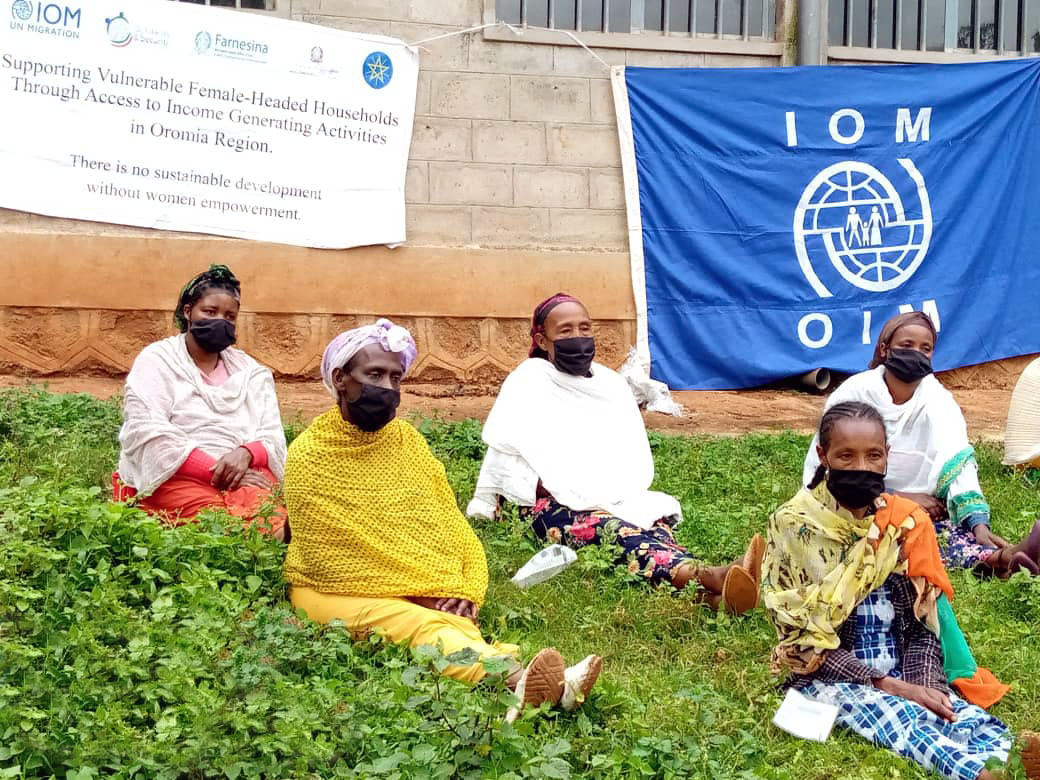A beneficiary at her shop, which was set up with assistance from IOM. Photo: IOM Ethiopia
Addis Ababa – Kedija Abdo is just one of many women who struggle to make ends meet in Ethiopia’s Bulehora District, West Guji Zone.
“I shoulder most responsibilities such as buying food, acquiring clothes and providing shelter for my family. Despite my efforts, it has been very difficult to fulfill their needs,” says the 35-year-old mother of five.
“With not many work opportunities in our town, coupled with insufficient initial capital, putting enjera (traditional bread) on the plate for my three children has always been a major challenge,” added Kedija’s neighbour, Zenash Zelaleme.
The two women’s plight has been noticed by IOM. After assessing the vulnerability of female-headed households in West Guji Zone, Oromia and Fafen Zone, Somali region, IOM Ethiopia provided them with the skills, along with agricultural materials and cash support to set up small businesses.
Both Kedija and Zenash have received such livelihood support which has enabled them to start retail shops. They are now able to provide for their families.
IOM aims to improve the socio-economic status of female-headed household among internally displaced persons and other households in the host community. Between May and August 2020, 560 individuals in Oromia and 100 in Somali regions have benefited.

Beneficiaries during on-farm training at West Guji Zone. Photo: IOM Ethiopia
“This support is especially vital for female-headed households as they are the ones who often take care of the children and are most vulnerable during displacements,” explained David Coomber, the Programme Manager for IOM Ethiopia Transition and Recovery Division.
He added: “The project is working to diversify the income of these women to build their resilience to food insecurity. We are providing the support to displaced persons and host communities to provide them with economically viable and resilient livelihood portfolios.”
The livelihood project is a two-year project funded by Italian government and is designed to help find sustainable solutions to vulnerable communities in Oromia and Somali regions.
The project is implemented in close coordination with the Ministry of Women, Children and Youth Affairs, the Ministry of Peace and the Ministry of Agriculture and Rural Development at the federal level. IOM is working with sectoral bureaus such as the Small Enterprise Agency at the regional level while also collaborating with other UN Agencies, international and national organizations and local counterparts that have the requisite mandate and expertise in the targeted sectors.
Among the approaches followed by the IOM team, the main one entails assisting displaced and host community households to make informed decisions on various livelihood options. The tailored technical support includes training in farming and the provision of in-kind agricultural inputs. This mainly focuses on the production of poultry, dairy as well as growing vegetables through drip irrigation.
Within the coming weeks, IOM will also distribute 100 chickens, 50 dairy cows, and 170 kg of home gardening seedlings like onion, tomatoes, potatoes, chilies, cabbage and carrot.
Apart from helping women establish micro enterprises, IOM is conducting skills training empower women to earn an income, thereby reducing their vulnerability.

A mini cafe and retail shop business in Gelana district. Photo: IOM Ethiopia
After the training, cash support is provided to those who meet a set of criteria. To date USD 448,551 has been made available in the two zones, benefiting 650 female-headed families.
An additional aspect of the project is to strengthen market linkages between providers of agricultural inputs, livestock cooperatives and the private sector.
COVID-19 Response to Female-headed Households
In an ongoing effort to minimize the spread of COVID-19, IOM has distributed face masks and hand sanitizers to 274 female-headed households in the two target regions. IOM has also trained them on COVID-19 preventive measures as stipulated by the Ministry of Health.
This article was written by Alemayehu Seifeselassie from IOM Ethiopia